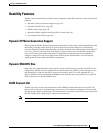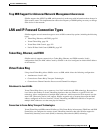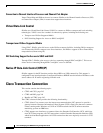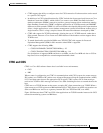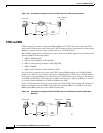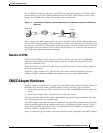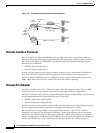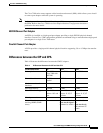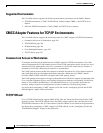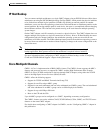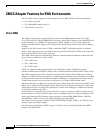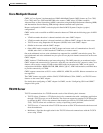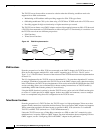
Overview of IBM Networking
CMCC Adapter Features for SNA Environments
BC-250
Cisco IOS Bridging and IBM Networking Configuration Guide
CMCC Adapter Features for SNA Environments
The Cisco IOS software supports the following features for CMCC adapters in SNA environments:
• Cisco SNA, page 250
• Cisco Multipath Channel, page 251
• TN3270 Server, page 251
Cisco SNA
The CSNA feature provides support for SNA protocols to the IBM mainframe from Cisco 7500,
Cisco 7200, and Cisco 7000 with RSP7000 series routers, using CMCC adapters (over both ESCON and
parallel interfaces). As an IBM 3172 replacement, a CMCC adapter in a Cisco router supports the
External Communications Adapter (XCA) feature of the Virtual Telecommunications Access Method
(VTAM).
Support for the XCA feature allows VTAM to define the CMCC’s Token Ring devices as switched
devices. XCA support also allows the CMCC adapter to provide an alternative to FEPs at sites where the
NCP is not required for SNA routing functions.
The CSNA feature supports communication between a channel-attached mainframe and the following
types of devices attached to a LAN or WAN:
• PU 2.0 SNA node
• PU 2.1 SNA node
• PU 5/4 SNA node
CSNA also supports communication between two mainframes running VTAM that are either
channel-attached to the same CMCC adapter card, or channel-attached to different CMCC adapter cards.
The CSNA feature provides SNA connectivity through a MAC address that is defined on an internal
adapter in a CMCC. The internal adapter is a virtual adapter that emulates the LAN adapter in an IBM
3172 Interconnect Controller. Each internal adapter is defined in a corresponding XCA major node in
VTAM, which provides an access point (LAN gateway) to VTAM for SNA network nodes.
The internal adapter is configured on an internal (virtual) Token Ring LAN located in the CMCC. Each
CMCC can be configured with multiple internal Token Ring LANs and internal adapters. Each internal
Token Ring LAN must be configured to participate in source-route bridging to communicate with the
LAN devices attached to the router.
By providing Cisco Link Services (CLS) and the LLC2 protocol stack on the CMCC adapter card, all
frames destined to or from the CMCC adapter card are switched by the router. The presentation of LAN
media types allows the CSNA feature to take advantage of current SRB, RSRB, DLSw+, SR/TLB,
internal SDLLC, QLLC services, and APPN functionality through SNASw.
The CSNA feature can coexist with the CLAW, TCP/IP Offload, CMPC, CMPC+, and TN3270 server
features on the same CMCC adapter.
For details about configuring a CMCC adapter for CSNA, see the “Configuring CSNA and CMPC”
chapter in this publication.



